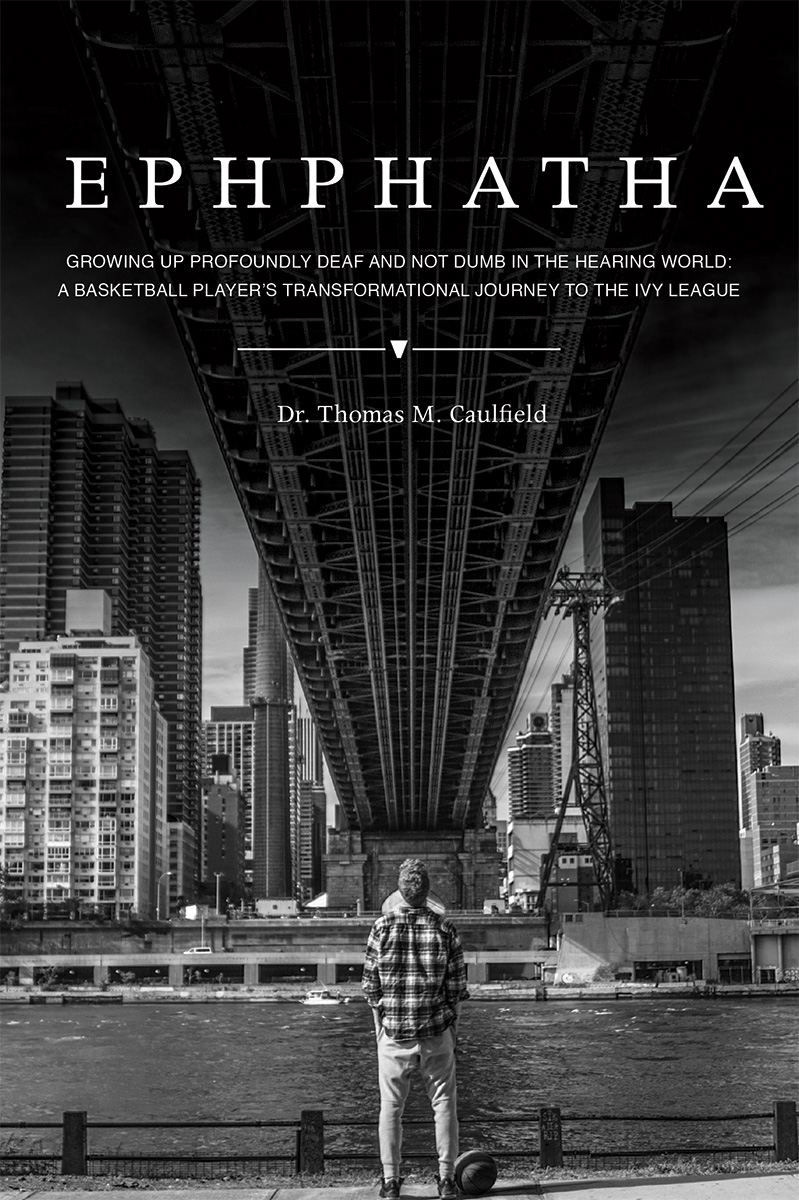Book Versions




FOREWORD
by Christopher Caulfield
When I was in high school I was driven to be the ultimate student athlete. Like many young boys, I wanted to play basketball in college. Given the trajectory I was on in my early teens, I believed this was something I could do. I never saw myself playing in the NBA or even overseas. I knew in my heart that the odds of my playing professionally were astronomical.
It also became very clear to me that if I could, I would like to go to college twice, once to play basketball and the second time to focus most completely on academics. Through an incredible amount of work, I had excelled at both, but it had been a constant struggle. I wanted more time so I could do it all! You see, I had challenges in my life that not many of my peers could ever understand. Challenges that shaped who I was then and who I would become.
Being born Deaf is all I have ever known. Not just Deaf, but profoundly Deaf—I essentially had no hearing at all at birth. Just like playing professional basketball, the odds of me being born with no hearing were in that same realm. It meant many difficult decisions for my parents, challenges in schooling and in my relationships, and hurdles in basketball that others simply never had to face.
You are about to read the true story of a transformational journey that, yes, really did happen to me. My dad kept a secret journal for the first twenty years of my life, knowing that my journey was something remarkable. He hoped someday when he presented it to me that I would enjoy it as his special gift. None of us in our family would have ever imagined that this journal kept for two decades would someday help others learn from our experience and face their own life challenges. The obstacles we faced as a family were at times almost unimaginable, but our strong bond kept us going. Looking back I wonder, if those things hadn’t happened to me, would I have achieved all that I have?
As you read Ephphatha you might find yourself laughing and crying at the same time. I too still look back with extremely intense emotions. But for me, it is a heartwarming chronicle of overcoming obstacles, making sacrifices, and keeping the faith that this is the path I was meant to take.
Ephphatha is a very powerful word that means to “be opened.” Although some people were less than helpful with my progress, the real heroes came into my life via family, medicine, and education. With those special people helping me, my path could “be opened.”
So as you read, please remember that for all this to have happened it required people, including me, to “be opened.” I might not have set any records being invited to birthday parties when I was growing up. And, yes, both kids and adults were unkind to me. However, my support came from those who did open up. In them, I learned an incredible life lesson. And that is, everyone has the right to be understood. I will remember that forever!
PREFACE
As my wife and I listened to the doctor standing before us, I felt an incredible amount of fortitude for whatever life threw at us. My father had been disabled, and nothing—I mean nothing—stopped him from doing anything he wanted to do. Believe me, his children saw this firsthand with his relentless approach to life. He easily beat me in basketball contests despite his disability, and he was a great writer even though he never had the chance to attend college. Seeing him persevere each and every day gave me a strength that others who had not experienced this adversity didn’t know, and now that fortitude was coursing through my body. Yet when the pediatric audiologist informed us that our twelve-month-old son was profoundly Deaf, I wondered if that fortitude would be enough.
Standing there, confused and overwhelmed, I knew one thing for certain: our life was about to get very hard. Almost like a movie, it began to play, and at that early moment in time, just after Christopher’s diagnosis, I began to write. I knew what we were about to experience would be challenging and I wanted to capture it all. The journals I kept were the genesis of this book.
The writing came easily at first, but later, in the most difficult times, it also was unbearable. Thankfully, there were the intermittent periods when things were going our way and we actually started having experiences that somewhat resembled those of other families. But it seemed always lurking were serious medical complications that required us to travel coast to coast for treatment.
Besides the medical challenges, we faced a similar wrestling match with the educational system. Whose right was it to choose the intervention strategies that would best help Christopher? It was a struggle that would last more than a decade.
Candidly, I knew we were up against incredible odds when a Catholic nun with more than fifty years of Deaf education to her credit told me, “Dr. Caulfield, in all my years, I am not sure I have seen a family so relentlessly try to combat all the hardships that come with raising a child with such a profound disability.” She counseled me to pace myself, adding that if I did choose to scale back my efforts, I could one day look back and honestly say that a great deal had been accomplished. The day she spoke to me, I felt like I was out on a limb cutting with a saw and found myself on the wrong side of the tree branch.
Through it all I continued to write. In one particularly tough period, I remember wanting to post a big, bold warning: If you keep reading this journal, be advised it is not for the faint of heart.
Maybe simply by the grace of God, Christopher turned out to be a phenomenal athlete, and with his talents came all sorts of rights and privileges that he as a Deaf kid never knew existed. Combined with that athletic prowess was Christopher’s incredible horsepower academically. With our student athlete by our side, resilience fueled us to combat all of our social, medical, legal, and religious hardships.
As we battled I continued to write, and as we endured for another decade, I knew the important thing to capture was not who was right within our circumstances but rather what was true.
So we persevered, all the while keeping faith that eventually our path would “be opened”—ephphatha—and we could make our way. And maybe when it was all over, our wish would be to have enough resilience remaining in our spirit to bring hope and assistance to others struggling in their own lives.
CHAPTER 1
A Baby Is Born
In late August of 1995, my wife, Jen, and I welcomed our son, Christopher, into the world. Weighing in at almost eleven pounds at birth, he was a huge baby, and I immediately began to plan his future in athletics. The intellectual side of me knew there was no significant correlation between a baby’s birth size and his eventual stature, but a dad can dream, can’t he?
We had gone to church that Saturday evening, and like most Saturdays, it was family time for us to spend with our four-year-old daughter, Rachel. My wife, who is very tall for a woman, usually moved from room to room in just a few swooping steps. With her standing close to six feet, we joked in our house that she was five-foot-twelve. But with the baby due any day now, she wasn’t feeling so energetic as she played with Rachel. When she found me in the family room and casually stated, “Tom, my water broke,” the scene abruptly changed. Instead of hanging around the house, we dropped Rachel at a friend’s place and headed to the hospital.
While the contractions were still far apart, I had time to take in my surroundings. I was amazed to see how much the labor and delivery room looked like a hotel suite. I mean, it had a TV, a very comfortable recliner, and a great view! Heck, it was kind of like Club Med, as they even asked if I needed anything to eat or drink. The mood changed once again when those contractions became stronger. I shifted into my stand-by-the-bedside position, ready for those powerful grips I remembered my wife putting on my hand with the birth of our daughter. As things became even more intense, my wife’s Club Med bed suddenly converted into operating room equipment. Various carts were unveiled and brought closer to her bedside with all the monitors, tubes, and attachments ready to roll. We were not in Club Med anymore!
As my wife’s pain began to rise, a casual request was put in for an epidural. In the nicest way possible, the nurse said, “You are not quite dilated enough yet.” Within the hour my wife more assertively requested the epidural. Request denied. At that point I witnessed for the second time something come over my wife. Ever the diplomat at work and in her ways at home, she now had the look in her eyes of being possessed. So there we were, a mild-mannered Mrs. Caulfield suddenly looking like she could hurt someone if they didn’t give her that epidural. Soon after that, a collision of words was inevitable. It went like this: Nurse asks nicely, “So how are you doing?” Possessed woman responds with a voice I had never heard before, “Give me that damn epidural.” I thought, “Oh boy, I hope they don’t kick us out of here.” Luckily the doctor arrived at that time and approved the pain management request.
Once the drugs were working, things moved to serious labor and for the next four hours it was relentless physical exertion on my wife’s part. Our son came into the world looking good! Although the doctors must have performed a whole battery of tests during Christopher’s stay in the hospital, our family saw his ten perfect fingers and toes and happily went home. After all, we had done this same drill four years ago with the birth of our daughter. Now she was a big sister!
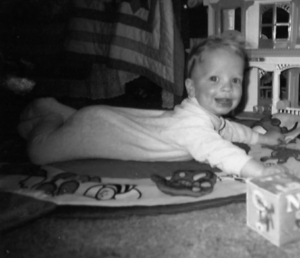
Christopher at three months
When Christopher arrived home from the hospital, Jen and I were consumed with the responsibility of having two children. We were both working parents who knew in our hearts that we had to give our family the utmost priority during this busy time in our lives. I had witnessed significant levels of dysfunction in my immediate family due to overzealous, job-oriented adults who pushed the career path accelerator with-out first checking the rearview mirror to see where their kids were. We refused to repeat that mistake.
Many respected child development specialists had extensively commented on the topic. In the early 1990s, we attended an event at our local college’s basketball arena to hear a nationally known child psychiatrist speak. Our daughter was to be born later that year and we were eager for information. After the speech, a woman in the audience stood up and asked a huge question: “What is the best way to raise children?”
I thought, “Man, how could anyone answer that?” I mean the complexity of that question could easily have rivaled, What is the meaning of life? I sat in the audience with all sorts of existential anxiety settling into my body. But to my surprise, the good doctor responded as easily as could be. The key to raising children, he said, was to have both parents involved in the process. He added that it would be best for the children’s early developmental years if both parents were able to work half-time. In this day and age, that kind of an arrangement could be tough financially for a lot of people. While the doctor acknowledged that financial strain can have an impact on families, he still believed their children would be better off develop-mentally in the long run. Well, after I heard that, it was as if I had discovered the Holy Grail of parenting. I had grown up in a poor, Irish Catholic family in Chicago, and we had really known how to stretch a buck. I was not afraid of financial strain. I believed the doctor’s advice would work for my own family and wanted to give it a try.
Later that night, however, I pondered how I could put the speaker’s advice into practice. Could we really put our careers in neutral? I said to myself, “Wait, I have dreams too!” I had just graduated with a doctorate in my field, and I was ready to make my move on the world. But I couldn’t ask my wife to stay home full-time. She had just earned a professional degree herself. There was no way she would want to put on the brakes so soon. Sitting in the living room, we talked over how we wanted to raise our children together. We both had aspirations, but we also saw the value in the doctor’s advice. We came to the conclusion that it would be best if each of us could work part-time. I was able to do this because a new business opportunity had recently come my way. Thankfully, my wife’s workplace was also supportive of her working a twenty-hour week. It was a done deal. The two of us were off on our co-parenting quest for the perfect life.
Before having children, Jen and I took in and nurtured a couple of cats. After that successful experience, the two of us believed we were ready for an even larger challenge. Our daughter, Rachel, was born in 1991, and my wife and I had the time of our lives during her early formative years. Learning had come easily for Rachel, and she had been eager for the start of preschool. Unbeknownst to us, our little redheaded daughter would be instrumental in helping us raise Christopher.
At the age of four, Rachel had performed exceptionally on a battery of educational placement tests, demonstrating she was more than up to the challenge of a highly selective laboratory preschool in our college town. She was a natural, too, in the support role for her mother. Those stories of the jealous older sibling went out the window at our home. Rachel, ever the altruist, made me feel just plain lucky to be part of such a loving and giving family!
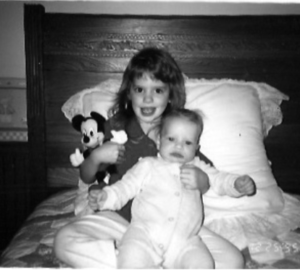
Rachel at four years old with Christopher
Christopher’s temperament as an infant was different from Rachel’s right from the Rachel at four years old with Christopher start. Whereas Rachel had been a laid-back baby, Christopher was extremely active and explored everything that came anywhere near his grasp. Rachel was the perfect helper and did whatever it took to make sure Christopher was comfortable during his first year of life. Our family had a great deal going on, and we have all the family videos to prove it. However, the direction of our lives would soon be changing. Shortly before Christopher’s first birthday, I received a call at work from my wife. Jen never calls me at work, so I had a feeling something was up. I answered the phone and after our usual greetings she very calmly said, “Christopher hasn’t been turning his head to noises around the house.”
I was confused at first. “Say that again?”
“I’m sure it’s nothing. He just isn’t really responding to sounds in the house. Or out of the house, either.”
You can be sure I was not as calm as she was. I left my desk and headed home immediately.
When I reached home, Jen and I strategized how to test our son’s hearing. I wish I could say we performed sophisticated hearing analyses to determine what might be happening, but in reality, we banged pots outside of Christopher’s crib while he slept. The activity seemed heartless, but we feared the worst and needed to relieve our anxiety. Throughout all the noise, Christopher remained asleep that night. My wife and I were stunned. Surely, this couldn’t be happening. The next morning we called our local medical clinic for help. Neither Jen nor I spoke the D word in the days leading up to Christopher’s medical appointment.
Three days later, with Rachel in preschool, Jen and I drove with our small son to the doctor’s office. Our pediatric neurologist prided himself on bonding with his toddler patients with not only a pleasant disposition but also a very colorful lab coat with Disney characters embroidered on it. “We’re in good hands here,” Jen assured me with a nod. We both tried to relax, for Christopher’s sake. We didn’t want him to pick up on our anxiety and get scared. When the doctor entered the room, Christopher’s eyes locked in on that fun lab coat and all the other vibrant pictures the good doctor had posted in the room and he was all smiles. We were off to a good start!
The doctor said his hellos, then pulled a tuning fork out of his lab coat. Christopher gave it a quick glance before returning to his visual scan for more interesting stimuli nearby. The doctor flicked the tuning fork and it began to hum. He then brought the tuning fork around the sides of Christopher’s head in quest of a reaction. I too hoped for a response, but Christopher took no notice.
With that, we were off to an otologist for a full-blown hearing test. No one had used the D word yet, and I wondered if this visit would be the day. The medical model and all of its exhaustive techniques seemed to be narrowing in on something. At the same time, I was gradually getting to the point where I just wanted to scream “DEAF” in an attempt to own it.
In one bit of luck, the medical clinic in our town was quite large and thus one can easily span numerous divisions of medicine in less than a five-minute walk. Upon arrival at the otologist’s office, we first met with an audiologist who asked us a series of questions. At the end she asked, “Are any of you claustrophobic?” She then explained that we would be in a small soundproof booth. “Some people get anxious in there,” she said. Jen and I looked at each other. “We’ll be fine,” Jen said, but we had no idea how Christopher would feel in there. As we walked into the booth, I was reminded of a recording studio that you might try to fit in your closet. High-tech gadgets surrounded us. Jen and I each took a chair, and Christopher sat on my lap while we waited for the test to begin. We had been told a series of sounds or tones would be pumped into the booth in an attempt to elicit a response from Christopher. We could see the audiologist through the glass sitting in front of an electronic panel with her special headphones on. Once again Jen and I tried to contain our nervousness.
“Okay, Mr. and Mrs. Caulfield, we’re going to start the test now,” the audiologist said through the sound system. And then the tones came in. Each one lasted just a moment before the next one sounded. Over and over for what seemed like an hour the tones came and went, with the audiologist meticulously taking notes every step of the way. I watched the audiologist for some sort of facial expression that would indicate a favor-able result, but she remained stoic and professional the whole way through. As I stared through the glass I couldn’t help but display a bland affect back. We left that afternoon still unsure of what the test had revealed.
A few days later we were asked to return to the clinic to learn more about the test results. We were shown into an exam room and began our wait. After some time, the doctor walked into the room and without hesitation said, “Your son is profoundly DEAF.”
Although I had been anticipating this diagnosis, my mind was not ready. As my brain took in the big D word, my mouth rapidly fired out numerous questions. I had been bottling up my fears and now they came tumbling out. At last I asked the audiologist, “Will Christopher ever be able to receive any sort of an education?”
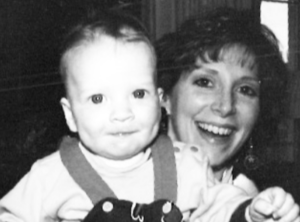
Christopher and Jennifer
That’s when I noticed there was a team of at least four professionals in the room with us, including an audiologist. This group was ready to support us in our time of need. I vaguely recall the answer to my education question involving the word main-streaming. I had graduated from grade twenty, and I honestly had never heard the term. It probably wouldn’t have mattered anyway because, even though it had only been a short time since I had been told of Christopher’s diagnosis, I was pretty sure I was heading into shock. I asked myself, “What type of life will Christopher have? Will he ever get married? How will he learn to talk if he can’t hear?”
At that moment I thought I needed to display undeniable fortitude, which wouldn’t allow me to feel any sadness about Christopher’s deafness. If Christopher ever asked me if I had felt sad when he had first been diagnosed, I wanted to be able to respond with an honest, “No.” Would that answer be truthful? I sure hoped it would be. I guess I wanted more than ever for our family to lead our lives in such a way that I would be able to respond to Christopher in this manner if needed. I would never want him to believe that I had wished for him to be any other way. As I sat feeling stunned in that doctor’s office, I was sure of one thing: life was about to get much more challenging for our family.
After we received Christopher’s diagnosis, we talked to the doctor about our options. Hearing aids were the first stop. Christopher was always a happy kid who loved to see and do new things. Being fitted for hearing aids was not one of them. To make a hearing aid that fit comfortably, a technician first had to make a mold of Christopher’s ear. Making the mold required goopy stuff to be inserted into each ear and held in place until it set. Ear one went smoothly, but when it came time to do ear two, Christopher wiggled and fought us. Ultimately he had to be restrained. Who could blame him? No one would want someone to stick rubbery stuff in their ear.
At our next visit, we received the hearing aids along with proper instruction on how to insert them. We left, feeling nervous and hopeful, ready to see how good those puppies were. Christopher spent most of the day taking them out and investigating them before placing them in his mouth.
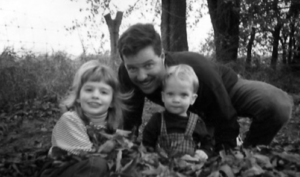
Rachel, Tom, and Christopher
Christopher very much disliked wearing the hearing aids, and getting them fitted in his ears each morning was a physical and emotional struggle. After several days, Jen couldn’t take it anymore, and I quickly absorbed it as my morning duty.
Going out in public presented us with more new challenges. I was continually amazed at how many people stared at Christopher. Clearly they had never seen hearing aids on such a small child. Generally they appeared to feel sad for Christopher, but he didn’t mind at all. He simply returned each of their gazes with a smile. I wondered at what age he would begin to take those extended gazes personally. Over the next weeks and months the hearing aids continued to be a problem and soon I began to feel sorry for the hearing-impaired adults who had to wear them, because, in my opinion, those dang hearing aids were the worst. We needed to find a different solution.
Contact
View the Ephphatha Media Kit here. For additional media inquiries, please contact the author by using the form below.

